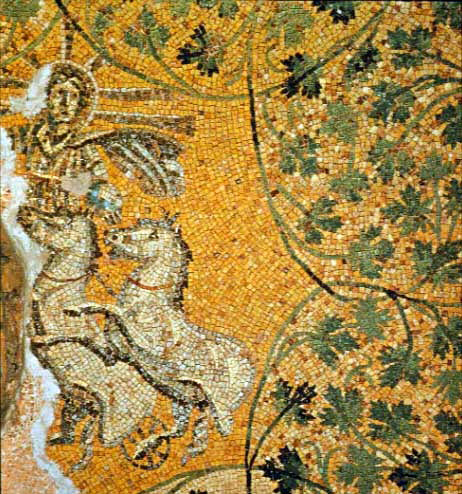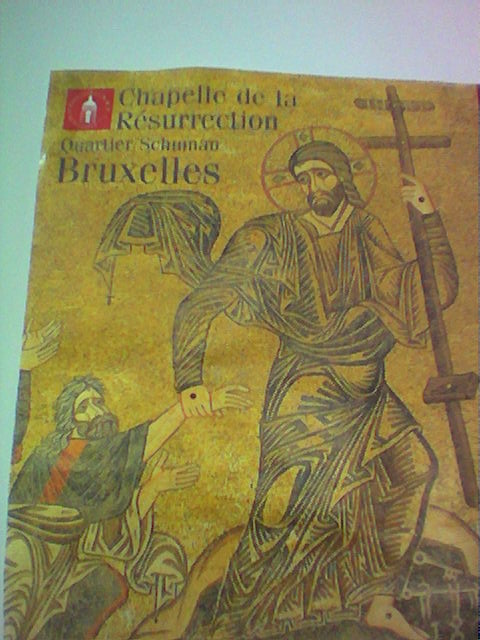Advent Sunday1 (30 Nov 2008)
Is 63. 16b-17,19b,64.2-7; Ps 80; 1Co 1. 3-9; Mk 13. 30-37
Homily of Fr. Paul Panaretos, S.J.
We Measure Time Differently
Is 63. 16b-17,19b,64.2-7; Ps 80; 1Co 1. 3-9; Mk 13. 30-37
Homily of Fr. Paul Panaretos, S.J.
We Measure Time Differently
Some may consider sobering Isaiah’s plea, which opened today’s liturgy of the word: Why do you let us wander, O Lord, from your ways, and harden our hearts so that we fear you not? Return for the sake of your servants...Oh, that you would rend the heavens and come to us. If we live with an image of an angry deity rather than God, who is our Creator and Redeemer, then the prophet’s plea would be sobering, indeed even frightening.
However, we know that for us Catholics sobering words invite us to new life not to fear life. Nor are Isaiah’s words imprisoned by time and locked in the unreachable past. We pray at each mass that God would make our hearts more supple and help us walk in God’s ways. Harden[ed] hearts distort the actions which flow from them; they distance us from God, both the results of sin. Catholic worship is clear about that, which is why we pray at each mass after the Lord’s Prayer, “Deliver us, Lord, from every evil and keep us safe in our day. In your mercy keep us free from sin as we await with joy the coming of our Savior, Jesus Christ.”
 We pray to walk more resolutely in God’s ways because God in Jesus by their Spirit entrusts us with a mission to be alert to the future coming of our Savior and to his continual presence with us as we extend his saving work.
We pray to walk more resolutely in God’s ways because God in Jesus by their Spirit entrusts us with a mission to be alert to the future coming of our Savior and to his continual presence with us as we extend his saving work.Jesus did not merely tarry on earth; he formed a people to do his work until that day of his return at the end of time. No one knows that day nor can reckon its hour. People through the ages have wasted so much energy over that even though the authority about our not knowing how to reckon it is Jesus himself: of that day or of that hour no one knows, not even the angels in heaven, nor the Son, but only the Father./*/
The point is not about knowing or guessing. It isn’t about God keeping us out of the loop, as we’d say today. The point is so that our being alert to both the future coming of our Savior and to his continual presence with us won’t be shattered by false prophets of frantic frenzy or of apathetic disregard and unconcern.
That makes us true prophets, who bear a different set of expectations than false prophets whose number is too large. They see the future through the lenses of frantic frenzy, which lead them to fear rather than hope, and through the lenses of apathy, which make them inert rather than servants of Jesus’ name. Prophetic, Christian attitudes to self, others and the world receive expression by prophetic disciples today.
 We measure time not by centuries and milennia nor by the rise and fall of nations. No. We measure time by God inviting us in Jesus and by Jesus empowering us to live our baptismal commission as his witnesses day by day.
We measure time not by centuries and milennia nor by the rise and fall of nations. No. We measure time by God inviting us in Jesus and by Jesus empowering us to live our baptismal commission as his witnesses day by day.Jesus encourages us as he encouraged his first disciples: “Be watchful! Be alert!” Jesus encourages us to have a daily concern for our mission. Obsessive focus on the day of the Lord’s second coming distracts us from our mission as prophets today. It distracts us from being aware that we are coworkers of Jesus, who seek to extend his mission and refuse to allow time and its concerns to supersede Jesus’ concerns or to diminish our concern for them.
The grace is that Jesus adapts his concerns and our mission to human time, not the other way around. The end will arrive when the mission is satisfied. That frees us to live without apathy or hysteria so that our mission-efforts will be truly effective. Jesus’ mission is the reason we are alert and eager stewards.
In your daily 15 minutes with Jesus this week, yield control and bask in the love of the Trinity embracing you. Ask the communion of saints to present you to Jesus so that you may converse with him. Speak with Jesus about what worries or disturbs you about being his missionary and about what elates and energizes you when you serve in his name. Desire with all your heart to be a more eager steward of Jesus’ words and deeds. Close by saying slowly the Lord’s Prayer, which reminds us at the start that we are ambassadors of the kingdom of God and that God gives us all we need to be its witnesses.
_____________
* These verses are left out of the passage in the lectionary, but they are crucial to why we live on alert--alert to Jesus’ words and mission.
____________________________________________
Wiki-image of a candle in hand is in the public domain. Wiki-image from an Advent flower shop is used according to the GFDL and the Creative Commons Attribution ShareAlike 3.0 license.












